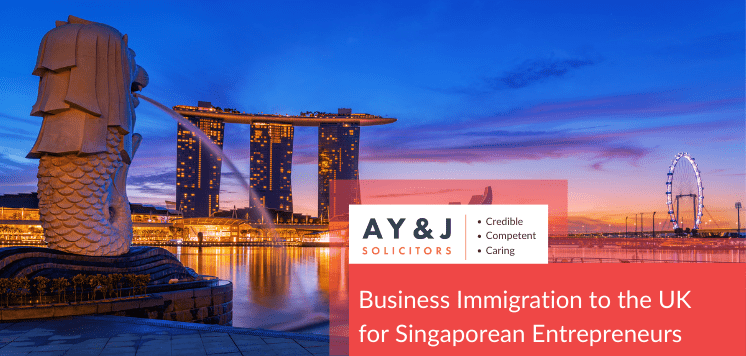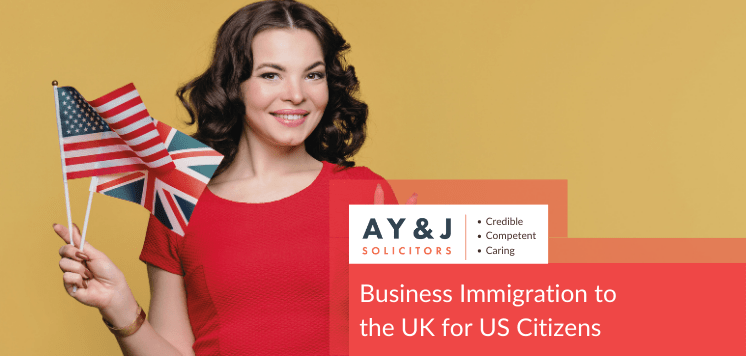Disclaimer: The information in this blog is accurate as of its publication date. Any updates after that date are not reflected here.
The United Kingdom is widely viewed as an attractive destination for Singaporean entrepreneurs who wish to establish a successful business here. There are several reasons for this. Firstly, the UK routinely achieves high rankings when it comes to ease of doing business. According to the World Bank’s most recent ratings, the UK ranks 8th of 190 economies for ease of doing business. The UK economy is also ranked as the 5th largest in the world based on GDP, ahead of France, India, and Italy. And with its open and liberal economy, the availability of world-class talent and a business-friendly regulatory environment, businesses thrive here. In this article, we will discuss some of the main business considerations for Singaporean entrepreneurs planning to move to the UK, including visa options, business culture, market entry strategies, tax, and the availability of support and resources for business leaders.
Table of Contents
UK Visa options for Singaporean Entrepreneurs
There are several immigration/visa pathways for Singaporeans who plan to establish a business enterprise in the UK. Most visas will allow you to bring your immediate family (i.e. your spouse and children) to the UK to live with you.
The most popular visas for Singaporean entrepreneurs are as follows:
- Innovator Founder visa: the Innovator Founder route is open to Singaporean entrepreneurs who would like to set up an innovative, unique, and viable business in the UK. Before applying for a visa, entrepreneurs must apply for and gain endorsement from an endorsing body approved by the Home Office. Innovator Founder visas are typically granted for up to 3 years, at which point holders can apply to renew their visa or for indefinite leave to remain (ILR).
- UK Ancestry visa: The Ancestry visa is available to Singapore nationals who have a grandparent who was born in the UK, the Channel Islands or the Isle of Man. Ancestry visas enable holders to live, work, be self-employed, and run a business in the UK. Visas are normally granted for up to 5 years, at which point it is possible to apply for an extension or permanent settlement.
- High Potential Individual (HPI) visa: the HPI visa is aimed at candidates who have graduated from a top university within the last 5 years. Only graduates of certain international universities can apply, including those who graduated from Singapore’s Nanyang Technological University (NTU) and the National University of Singapore. HPI visas are normally issued for up to 2 years (3 years for those with a PhD). Unlike the Innovator visa, HPI visa holders cannot extend their stay, but it is possible to switch to a different visa type (i.e. a business visa)
- UK Expansion Worker visa (Global Business Mobility): the Expansion Worker visa enables foreign employees to establish a branch or subsidiary of their overseas employer here. Expansion Worker visas are granted for up to 12 months. If you wish to stay longer on an Expansion Worker visa, you can renew up to a maximum of 2 years in total. If your plan is to settle permanently, you will need to switch to a different type of visa.
- Global Talent visa: The Global Talent visa is open to Singaporean nationals who are leaders or potential leaders in academia or research, arts and culture, or digital technology. If approved, Global Talent visa holders from Singapore can remain in the UK for up to 5 years. The visa can then be further extended. Alternatively, it is possible to settle permanently in the UK after 3 or 5 years.
- Self-Sponsorship refers to an application to come and work in the UK for your own businesss, under sponsorship of your own company. This can lead to permanent residency and British citizenship for yourself and your family.
This route may be relevant if you are a Singapore-based successful businessperson, and you have identified a business opportunity in the UK, OR you have a great business idea and want to explore your business opportunity in the UK,
and
-You want to own the UK business
-You want to lead, manage and maintain your UK business
-You want to live without fear of losing your UK visa status (i.e. sense of freedom)
To discuss the best visa route for your entrepreneurial needs, speak to an immigration Solicitor who can explain the options available based on your unique circumstances.
Navigating UK Business Culture for Singaporean Expats
As a Singapore entrepreneur living in the UK, you will notice some differences in how business is conducted, as follows:
- You will most likely find that British business people are less “straight-talking” and “to the point”. They are also used to making business decisions more slowly compared to people in Singapore.
- When it comes to language, there is typically no barrier for Singaporeans in the UK. Because English is commonly used, most Singapore nationals can comfortably communicate and do business in the UK.
- The dress code is normally formal in the UK; however, it is now increasingly common for even senior business people to dress in a more relaxed way (i.e. smart casual).
- If you are used to polite business card practice in Singapore, you will most likely find that this is far more relaxed in the UK. It is common to share business cards, but only as a way of ensuring you have each other’s contact details. There is generally no need to give and receive them with both hands.
And finally, don’t be shocked if you are invited to “go to the pub” for a drink (or a “pint”) with business colleagues. Going for a drink provides an opportunity to get to know those who you are doing business with and to discuss matters in a less formal setting.
UK Market Entry Strategy for Singaporean Companies
No matter the type of business you intend to establish or your industry sector, a robust and well-thought-out market entry strategy is essential when moving to a new market such as the UK. To ensure that your market entry strategy is fit for purpose, we recommend:
- Visiting the UK – by visiting the UK early in the planning process, you can get a better idea of the unique risks and opportunities of running a business here.
- Undertake UK market research – it is important to analyse the needs of the UK market for your service or product. By doing so, you can better understand the differences between the UK and Singapore markets.
- Decide how you will enter the UK market – there are many ways to enter the UK business market other than establishing a new business. You may consider acquiring an existing business in the UK, entering into a joint venture, franchising, direct sales, or using an agent or distributor.
- Setting clear goals for your UK business – this may include setting goals for when you will enter the market, future sales volumes, the products or services you will offer and when, and investment targets.
UK Tax Implications for Singaporean Business Owners
As a Singaporean national running a business in the UK, you will need to pay tax here if:
- You spend 183 or more days in the UK in any given tax year
- Your only home was in the UK for 91 or more consecutive days – in this case, you must have visited or stayed in your UK home for at least 30 days of the tax year
- You work full-time in the UK for any period of 365 days, and at least one day of that period was in the tax year you’re checking.
The tax rules also state that you are most likely to be classed as a non-resident if you spend fewer than 16 days in the UK or you work abroad full-time and spend less than 91 days here (of which no more than 30 were spent working).
If you are classed as a UK tax resident, you may be required to pay the following forms of tax to HMRC:
- Pay as you earn (PAYE) tax: this ranges from 20 to 45% and is payable on your income
- Corporation tax: your business will be liable for corporation tax of between 19% and 30% on any profits made
- Dividend tax: if you pay yourself in the form of dividends, you will pay tax on these amounts of between 8.75% and 39.35%.
Note: As a result of the UK/Singapore Double Taxation Avoidance Agreement, Singaporean nationals living in the UK do not pay tax twice on the same income.
Support and Resources for Singaporean Business Owners in the UK
For entrepreneurs coming from Singapore to the UK, there is a vast amount of resources and support available, including:
- The UK Government Business Support Helpline (England) – enquiries@businesssupporthelpline.org
- Founders Forum Group (FF Group)
- Prime Cymru – business support in Wales
- Institute Of Directors (IOD)
- British Chambers Of Commerce
- Federation Of Small Business (FSB)
- Supper Club (membership club for high-growth entrepreneurs above £1m turnover)
- The Forum of Private Business (FPB)
- The Confederation of British Industry (CBI)
- The British Council
- Business Networking International (BNI)
- NRG Business Networks
- The Business Network
A Y & J Solicitors is a specialist immigration law firm with extensive experience with all types of visa applications. We have an in-depth understanding of immigration law and are professional and results-focused. For assistance with your visa application or any other UK immigration law concerns, please contact us on +44 20 7404 7933 or at contact us today. We’re here to help!









